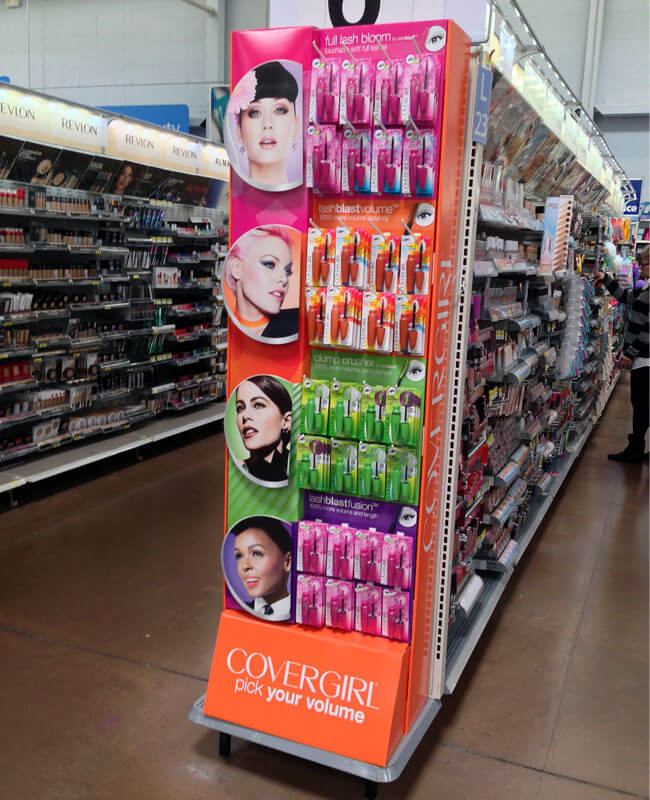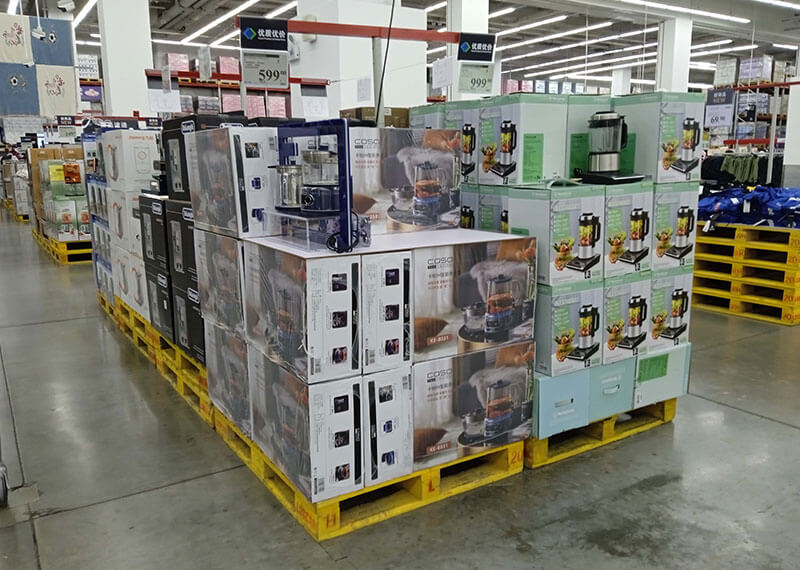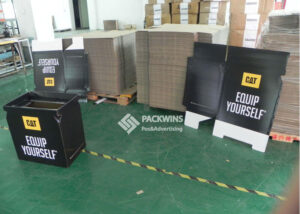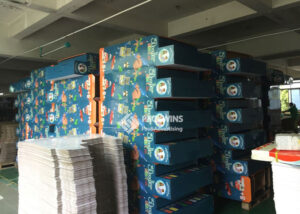What are Endcap Displays?
Have you ever walked into a store and noticed a striking display at the end of an aisle? These are endcap displays, a powerful tool in retail marketing. But what exactly are endcap displays, and why do they matter so much in retail strategy?
Endcap displays are strategically positioned product presentations located at the end of store aisles, designed to maximize visibility and drive sales. They serve as an essential component of effective retail merchandising, helping to highlight special products or promotions.

Image contribute to LEGO
- Definition and Purpose: Endcap displays are used to attract consumer attention by being placed in high-traffic areas, often featuring promotional or high-margin items.
- Visibility and Impact: These displays are positioned to be immediately visible to shoppers as they navigate store layouts, making them a prime spot for capturing interest.
- Strategic Placement: Retailers use endcaps to create focal points, encouraging impulse purchases and enhancing the customer experience.
Types of Endcap Displays?
With the variety of endcap display options available, choosing the right one can enhance your product presentation. But what types of endcap displays exist, and how do they differ in function and appeal? Understanding these options can help tailor your approach to meet specific marketing goals.
There are several types of endcap displays, including Pallet Displays, Case Stackers, Sidekick Displays, and Freestanding Endcaps, each serving unique purposes in retail. Choosing the right type is crucial for optimizing product visibility and customer engagement.

Image contribute to CoverGirl
- Pallet Displays: Utilized for showcasing large quantities of products, these are perfect for bulk items and help streamline stocking processes.
- Case Stackers: These vertical displays maximize space by stacking products in an organized manner, ideal for packaged goods.
- Sidekick Displays: Often attached to shelving units, these are suitable for smaller items and provide additional merchandising opportunities.
- Freestanding Endcaps: Offer flexibility and can be positioned anywhere within the store, allowing for creative and impactful product showcases.
Here is a table introducing types of corrugate displays and their features.
| Feature/Type | Pallet Displays | Case Stackers | Sidekick Displays | Freestanding Endcaps |
|---|---|---|---|---|
| Placement | At the end of aisles or in high-traffic areas | Alongside aisles, often as part of existing shelving | Attached to shelving units or as standalone units | Can be placed anywhere within the store |
| Ideal Products | Bulk items and heavy merchandise | Packaged goods, beverages, and stackable items | Smaller, lightweight products, often in impulse-buy categories | Versatile for a wide range of products, including promotional or seasonal items |
| Visibility | High visibility due to large size and prominent placement | Moderate visibility, typically at eye level | Moderate to high visibility, depending on placement | High visibility due to customizable positioning |
| Flexibility | Limited flexibility, as pallets are often fixed in place | Moderate flexibility; can be adjusted as part of shelving units | High flexibility; can be moved easily and attached to various fixtures | High flexibility in design and location |
| Setup Complexity | Simple setup; primarily involves arranging products on a pallet | Moderate complexity; requires stacking and securing products | Simple to moderate setup; involves attaching or arranging products on fixtures | Variable complexity; can range from simple setups to elaborate designs |
| Cost | Generally lower cost due to minimal setup and materials | Moderate cost, depending on the size and complexity of the arrangement | Moderate cost; can vary based on materials and attachment methods | Variable cost; depends on design, materials, and store location |
Benefits a Brand Gets from Endcap Displays?
For brands aiming to increase their market presence, endcap displays offer significant advantages. What specific benefits do brands gain from utilizing these displays, and how do they impact overall sales and visibility? Let’s explore how endcaps can elevate brand performance.
Endcap displays enhance product visibility, drive customer engagement, and boost sales by strategically highlighting brand offerings in high-traffic areas. These displays serve as a powerful marketing tool for brands looking to make a lasting impression. An effective endcap display increases upto 93% of product exposure and elevate sales volumn by 32%.
- Enhanced Product Visibility: Endcaps place products directly in the line of sight of shoppers, increasing the likelihood of purchase.
- Boosted Sales: The strategic location and promotional nature of endcaps often lead to higher sales volumes, especially for featured products.
Impulsive purchasing is quite common when shopping in supermarkets and grocery stores. In fact, it accounts for up to 62% of supermarket sales and can drive up to 80% of sales in specific product categories (Cheng et al., 2013). As reported by ScienceDirect.
- Brand Recognition and Loyalty: Consistent use of endcaps helps reinforce brand identity, encouraging repeat purchases and building customer loyalty.
Products Suitable for Endcap Displays
Selecting the right products for endcap displays can dramatically affect their effectiveness. How do you choose which products are best suited for this prime retail space? Identifying suitable products ensures that your endcap display achieves its intended impact.
Products that are new, seasonal, or on promotion are particularly well-suited for endcap displays, benefiting from the increased visibility and strategic positioning. Choosing the right products can maximize the impact of your display.
- New Product Launches: Endcaps provide an ideal platform for introducing new products to the market, capturing consumer interest quickly.
- Seasonal and Holiday Items: Aligning displays with seasonal themes helps tap into consumer buying trends and boosts sales.
- Promotional and Discounted Products: Featuring these items on endcaps can drive impulse purchases and clear inventory efficiently.
Club Store Compliance
Navigating the compliance requirements for endcap displays in different club stores can be complex. What are the specific guidelines for major retailers like Target, Walmart, and Member’s Mark? Understanding these requirements is crucial for successful execution.
Each club store, such as Target, Walmart, and Member’s Mark, has its own compliance standards for endcap displays, which must be adhered to for optimal display performance. Meeting these standards ensures a seamless implementation and maximizes effectiveness.
Target Endcap Requirements: Focus on clean aesthetics and brand consistency to align with Target‘s overall store image.



Walmart Endcap Standards: Walmart Emphasize cost efficiency and accessibility, ensuring that products are easily reachable and attractively presented.


Member’s Mark Guidelines: Prioritize showcasing member-exclusive products and value offerings to align with Sam’s club brand identity.
All to often In Sam’s Club there are pallet displays at the end of aisle to drive sales.


Here below is one of the products we get into Sam’s Club,
Design Tips & Tricks
Creating a captivating endcap display requires more than just product placement. What design strategies can make your endcap stand out and attract customer attention? Here are some tips and tricks to help you design an effective display.
Effective endcap design involves strategic use of colors, themes, and product placement to attract and retain customer attention. Implementing these design elements can significantly enhance your display’s impact.
- Bold and Bright Colors: Use vibrant colors that are consistent with your brand to attract the eyes of passing customers.
- Thematic Elements: Create a cohesive display by aligning products with a central theme, such as a holiday or seasonal event.
- Strategic Product Arrangement: Ensure products are placed at eye level and are easily accessible, encouraging interaction and purchase.
Order Steps to Follow
Ordering an endcap display can be a complex process if you’re unfamiliar with the steps involved. What are the critical steps to ensure a successful order and implementation? Understanding the process can help streamline your efforts and maximize display effectiveness.
The process of ordering an endcap display involves planning, design approval, and coordination with store management to ensure compliance and effectiveness. Following these steps is key to a successful display execution.
- Define Your Goals: Determine the objectives of your display, such as increasing brand visibility or promoting specific products.
- Design Development: Collaborate with designers to create a visually appealing and strategic display layout that aligns with your goals.
- Compliance and Coordination: Work closely with store management to ensure your display meets all store guidelines and logistical requirements.
Cost of an Endcap Display
Investing in an endcap display requires an understanding of various cost factors. What expenses should you anticipate, and how can you ensure a good return on investment? Analyzing these financial aspects can help you make informed budgeting decisions.
The cost of an endcap display varies based on factors such as design complexity, product selection, and store location, impacting overall budget and ROI. Effective budgeting ensures that your investment yields significant returns.
Design Complexity and Materials: More intricate designs and higher-quality materials may increase costs but also enhance the display’s visual appeal.
Display Costs: Consider the cost of the products featured on the endcap and how they fit within your promotional strategy.
Location-Based Pricing: Different stores may have varying pricing structures for endcap space, affecting your overall budget.
These expanded sections should provide your readers with a comprehensive understanding of endcap displays and how they can effectively utilize them in retail strategies.
Conclusion
Endcap displays serve as a powerful tool in the retail industry, enhancing product visibility and driving sales. By strategically selecting and designing these displays, retailers can effectively capture customer interest and promote their brand.



